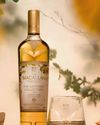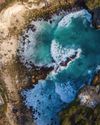
From a post-industrial wasteland to an art-filled utopia, the story of Japan's art islands in the Seto Inland Sea is one of redemption. There are three islands to be exact: Naoshima, Teshima and Inujima, all of which were on the brink of being damaged beyond repair. Naoshima and Inujima were left barren from a booming but destructive copper smelting industry, while Teshima was buried under nearly a million tonnes of illegally dumped toxic waste. That is until Japanese billionaire Soichiro Fukutake stepped in. Horrified by the destruction-namely the reckless environmental damage caused by corporations to the formerly pristine islands, Fukutake took it upon himself to give them a new lease on life, saying in a statement that he "decided to use art to fight against what society had done" while restoring the Shinto values of honouring and finding harmony with nature.
Today, three decades and about US$250 million later, the trio are teeming with art and flora set against picturesque coastlines, bringing in hundreds of thousands of visitors per year who come to enjoy the works of Claude Monet, Andy Warhol, Yayoi Kusama and David Hockney, to name but a few.
It all began in 1988 when Fukutake, who at that time was the president and representative director of Fukutake Publishing (now Benesse Corporation), approached renowned Japanese architect Tadao Ando to help him realise his vision of transforming the neglected and economically stifled islands into a paradise where visitors could come and admire works by some of the world's greatest artists. A sceptical Ando initially turned down the offer but was eventually convinced, and the Pritzker Prize-winning architect went on to design dozens of buildings across Naoshima, the most popular of the three islands.
This story is from the {{IssueName}} edition of {{MagazineName}}.
Start your 7-day Magzter GOLD free trial to access thousands of curated premium stories, and 9,000+ magazines and newspapers.
Already a subscriber ? Sign In
This story is from the {{IssueName}} edition of {{MagazineName}}.
Start your 7-day Magzter GOLD free trial to access thousands of curated premium stories, and 9,000+ magazines and newspapers.
Already a subscriber? Sign In

A Family Jewel
Fanty Soenardy unveils the crowning jewel of her vault-a Chaumet tiara that she dreams of passing down to her daughter on her wedding day

GROWTH MINDSET
Three women entrepreneurs share their smart habits to managing money and growing wealth—and doing so meaningfully with purpose

A Classic Redefined
Through the organic beauty of wood veneers, Steinway & Sons' limited edition Masterpiece 8X8 explores an alternative to the established aesthetic of pianos

Oak Artistry
Born of a collaboration with contemporary circus producer Cirque du Soleil, Vibrant Oak, the fourth release in The Macallan's Harmony Collection, pays homage to the Scottish whisky house's rich history with oak and the sherry-seasoned oak casks central to its heritage

Full Potential
Philippine tourism is buzzing with activity, and Christina Garcia Frasco is at the forefront of it all

Live & Learn
When Anthonia Hui and Leonardo Drago still lived in Hong Kong nearly three decades ago, they came across a beggar on the streets. “Just as I was about to pull out my wallet, Leo held my hand and said, ‘How do you know he’s not scamming you?’”

Hip to Be Square
Patek Philippe launches Cubitus, its first new collection in 25 years, in Munich, Germany, debuting three sporty and elegant watches By Annabel Tan

Marine Wonders
Rolex's Perpetual Planet Initiative and Mission Blue join forces to support the conservation of Indonesia's island paradise of Nusa Penida and its magnificent biodiversity

Deep Purpose
Rolex champions environmental conservation through its Perpetual Planet Initiative, which supports ocean-focused organisations such as Sylvia Earle's Mission Blue and Titouan Bernicot's Coral Gardeners

Grand Designs
When it comes to grand touring, few carmakers can boast the storied history of Maserati, which has been producing vehicles that embody grand touring's golden era, which originated in the mid-20th-century, for more than 75 years.